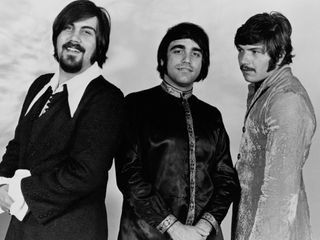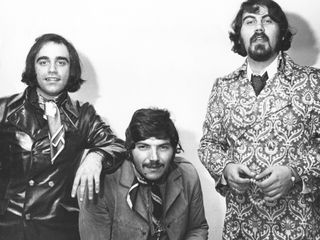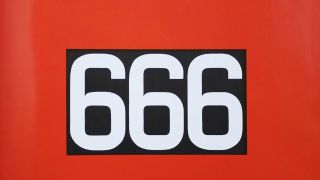To most in the prog community, there’s something almost mythic about 666, the third album from Greece’s Aphrodite’s Child.
Released in 1972, this is now regarded as a classic. Yet it was recorded under very difficult conditions, and by the time 666 finally came out, a full year after being finished, the band had split up.
This was Vangelis’ concept. He set out to make an album that was based on the Book Of Revelations, in the process taking the music into a more dense psychedelic undergrowth. But he did it against the wishes of bandmates Demis Roussos and Lucas Sideras, who wanted to go in a more chart-friendly, pop direction. However, the divergence of opinion just adds to the unique breadth and trajectory of the music.
The album opens with the chanting of the surprisingly confrontational “Fuck the system”, before Babylon and Loud, Loud, Loud begin an exploration of what can be achieved through layering atonal jazz sounds across a simple orchestral atmosphere. It’s a stylistic approach the band constantly return to throughout the album, as a variety of instruments and vocal attitudes are entwined. These include keyboards, congas, saxophones, choral interludes and the flute. It’s a mix of the ethnic and contemporary.
The Four Horsemen is unquestionably the most renowned track here. It’s the closest Aphrodite’s Child get to being accessible in a mainstream sense, with Demis Roussos providing a glittering vocal presentation that also has a slightly disturbing undercurrent.
Just how haunting and hypnotic 666 could be comes out when The Lamb follows on from The Four Horsemen, allowing everyone involved to indulge in a dreamstate freeform. The music is both remote, yet also introspectively apocalyptic. And the subsequent narrative on The Seventh Seal is not merely biblical, but socially aware of the need for people to be empowered.

While Aegean Sea has the effect of calming the turbulence, it also throws in the occasional spark of unease, something also mirrored on The Wakening Beast and The Marching Beast. It’s here that you can feel the surge of uncontrollable creativity, as the music rises and falls, and Do It is a full on banshee shrill of high speed jazz rock, punctuated by the appellation “Do it”.
There’s a lament about Vangelis’ vocals on The Beast, which is built around some stunning guitar from Silver Koulouris. And the monologue during Seven Trumpets acts as a clarion cry to join the freak show, in time for the disengaging Altamont, which has the visceral feel of treading through solidifying blood.
The surreal sensuality of The Capture Of The Beast, which has the impact of spiritual foreplay, leads into Infinity, during which actress Irene Papas brings herself to an orgasm through the mantra “I was, I am, I am to come” against a liberating percussive backdrop. This track of itself caused huge controversy at the time, but provides a primal entry into the more scenic pysch pop of Hic And Nunc, during which Demis Roussos delivers a tour de force vocal performance, while Vangelis plunks in a pseudo ragtime manner on the piano, before the epic All The Seats Were Occupied allows everyone the opportunity to give vent to a mound of ideas, which stretch across the canvas in bursts of energy, held together by an underlying feeling of disparate minds melded into a single thrust, heading towards the horrors of armageddon. And then, the album ends smoothly, soothingly with Break (which was a minor hit single in certain parts of Europe), suggesting we are all waking up from a nightmare than is fading fast, but won’t disappear. However, the last notes of the album actually tie back in with The System, and that’s the beauty of what’s here. It is cyclical. Occurring and reoccurring. A brilliant exposition of the imagery and imaginings in the original biblical text, brought to life by intelligent compositions which are arranged and executed with considerable skill. The use of Greek film director and actor Costas Ferris to write the lyrics add an extra dimension, as do spoken word and narrative passages.

It was a very brave album. But one not everyone was impressed by. The band’s label, Mercury, were certainly left bemused.
In fact, they were so horrified by the scope and challenge of the double album that they initially refused to release it. In particular, Papas’ graphic orgasm during Infinity struck the wrong chord with them. Eventually, the company relented and agreed to put it out on their Vertigo imprint. By this time, Roussos had issued his debut solo album and was on the way to becoming an internationally successful pop artist. And Aphrodite’s Child were consigned to obscurity. Except…
Well, the 666 album has taken on an afterlife that has seen it hailed as one of the great prog albums of the era. Rightly so. Despite the members seemingly in disagreement over where the music should flow, what they came up with was remarkable. Relying on inspiration and intuition rather than production has meant it’s not an album of its time, but remains as relevant in 2015 as it was in 1972. Perhaps more so. An album where any sonic idea, however insane, would be incorporated, changing the complexion of the overall fire.
It is a fittingly glorious reminder that there was a lot more to Demis Roussos than being a ‘fat bloke in a frock, who could sing a bit in a high voice’. His contribution to 666 is vital, and helps to accentuate the netherworldly atmosphere.


